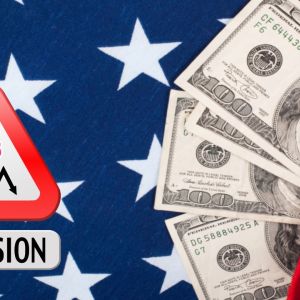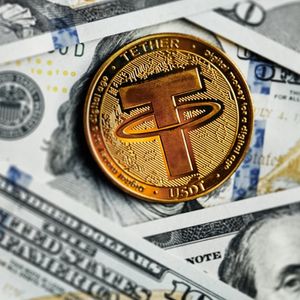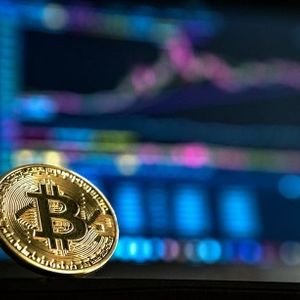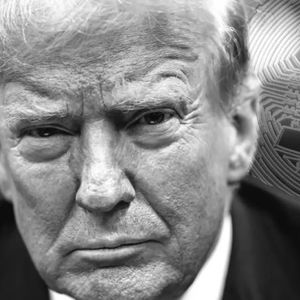The U.S. economy is heading straight for a wall. All signs point to a recession in 2025. It’s not even subtle. Economists, analysts, and market watchers are connecting the dots, and the picture isn’t pretty. The Walmart Recession Signal is screaming danger. This signal tracks Walmart’s stock price against the S&P Global Luxury Index, and guess what? It’s at its highest point since the world shut down in 2020. Walmart shares jumped a whopping 83% this year, while luxury goods stocks flatlined. History shows us what happens when this gap widens this much: a recession. Every. Single. Time. Consumers are tapped out, and unemployment is creeping up Americans are out of money. That’s the reality. Pandemic-era savings? Gone. Those stimulus checks that once kept people spending like the party would never end? Spent. Consumer spending, which is the backbone of the U.S. economy, is starting to sag under the weight of exhausted wallets. Retailers are feeling it. Restaurants are feeling it. The entire economy is bracing for impact. Continuing unemployment claims are up 15% compared to pre-pandemic levels. While unemployment rates aren’t skyrocketing yet, the cracks are showing. Rising claims mean more people are losing their jobs, and fewer are finding new ones quickly. If this trend keeps up, it’ll only feed into the recession spiral. Wages? Sure, they’ve risen, but not enough to keep up with inflation. People might be earning more on paper, but in reality, they’re buying less. That’s how recessions start. And about inflation—it’s still here. It’s better than the nightmare 9.1% peak back in June 2022, but October’s 2.6% rate shows we’re far from out of the woods. Economic forecasts clash, but the risks are clear Experts can’t agree on just how bad it’ll get, but no one’s denying the risks anymore. BCA Research is practically betting on a recession for both the U.S. and Canada next year. Their argument? The labor market is too shaky, and consumer spending is falling off a cliff. It won’t be another 2008-style disaster, but it’ll hurt. Goldman Sachs, ever the optimist, says not so fast. They’re banking on 2.5% GDP growth for 2025 and put the odds of a recession at just 15%. They’re clinging to the hope that policy changes under the next administration won’t shake things up too much. But then there’s J.P. Morgan, throwing water on Goldman’s sunny outlook. They’re pegging the recession risk at 45%, citing a shrinking money supply and potential global shocks as key threats. Let’s talk numbers. GDP growth predictions for 2025 are all over the place. Goldman’s 2.5% is on the high end, while some estimates go as low as 1.9%. The unemployment rate? That’s expected to hover around 4.2%, but if inflation stays controlled, it could drop closer to 3.5%. And the Federal Reserve? They’re unlikely to cut interest rates more than twice next year, so inflation will likely fire up as early as January. Global tensions and Trump’s policies As if the domestic economy wasn’t fragile enough, global risks are piling on. The Russia-Ukraine war continues to mess with energy prices and supply chains. Meanwhile, China’s economy is slowing down, and that’s bad news for everyone. If Chinese demand for U.S. exports drops, it’ll hit American manufacturers and farmers hard. And let’s not forget the commercial real estate sector, which is already feeling the heat from higher interest rates. Rising vacancies and falling investments in this space could spill over into broader financial markets. Then there’s Donald Trump. His return to the White House in January 2025 will come with a new set of policies, and some of them could tip the scales. His plans for tariffs are already raising eyebrows. A proposed 25% tariff on imports from Canada and Mexico and a 10% tariff on Chinese goods could drive prices up across the board. Goldman Sachs estimates these tariffs alone could boost inflation by nearly one percentage point. That’s the last thing the economy needs. And trade relations? Those could get ugly fast. Tariffs tend to spark retaliation, and a full-blown trade war could wreck supply chains and kill growth. Businesses that rely on cross-border trade would take a direct hit, leading to layoffs and higher prices for consumers. Trump’s tax policies might provide a short-term boost but could also backfire. Extending tax cuts for individuals and corporations sounds great until you realize it’ll likely balloon the federal deficit. If the economy doesn’t grow fast enough to offset the lost revenue, we’re looking at higher borrowing costs and a potential loss of investor confidence. From Zero to Web3 Pro: Your 90-Day Career Launch Plan




















